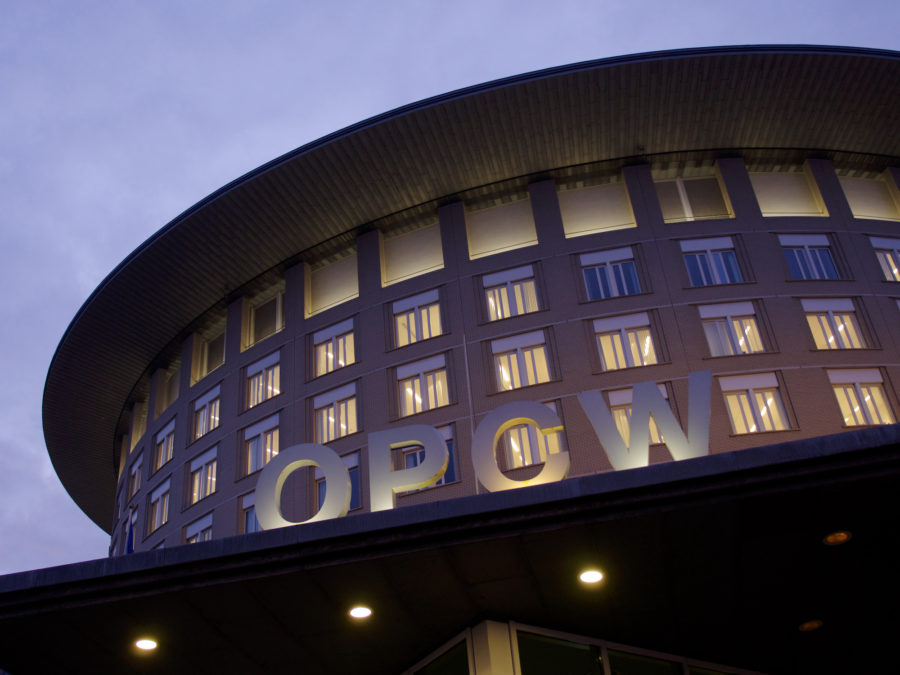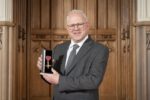11th May 2022
Science and the Chemical Weapons Convention

Dr Christopher Timperley is the Principal Advisor on Arms Control and Non-Proliferation at the Defence Science and Technology Laboratory (Dstl). He was the first UK scientist to be elected to the chair of the OPCW Scientific Advisory Board. He was appointed an OBE by Her Majesty the Queen in 2021 for his services to defence and security.
In 2013, I was appointed to the Scientific Advisory Board (SAB) of the Organisation for the Prohibition of Chemical Weapons (OPCW). This international organisation, based in The Hague, implements the Chemical Weapons Convention, a treaty which prohibits the development, production, stockpiling and use of such weapons.
The OPCW Director-General selects 25 members for the SAB from research institutions, universities, chemical companies and defence organisations, based on their knowledge of scientific fields relevant to the Convention. A diversity of expertise and a fair distribution of members from all geographical regions is ensured in the appointments.
The maximum term for a SAB member is 6 years and members serve in their individual capacity as independent experts. This separates the science from the politics. The SAB enables the Director-General to render specialised advice on science and technology relevant to the Convention to the policymakers of its member states (now 193 countries out of a possible 197). Every year SAB members propose and elect the Board’s Vice-Chair and Chair. The members elected me as Vice-Chair in 2014 and Chair from 2015-2018. I was honoured to perform this role: all SAB members, OPCW staff and other people involved, were a pleasure to work with.
The SAB assesses and reports to the Director-General developments in science and technology. This involves coordinating the efforts of Temporary Working Groups established by the Director-General; providing technical advice to the OPCW on request; delivering every 5 years a scientific report, which makes recommendations, to assist member states improve further the operation of the Convention (these events are known as Review Conferences); and, if originated by member states, advising on proposed changes to the Schedules of Chemicals (those chemicals subject to verification).
My first SAB meeting was in June 2013 in The Hague. There we mapped the programme of work that culminated in the delivery of our scientific report to the Fourth Review Conference in 2018. Conversation focussed on the role of the OPCW after the destruction of the declared chemical weapons stockpiles. But optimism was checked by rumours, later substantiated, of the military uses of chemical weapons by the Syrian government, despite Syria joining the Convention in 2013. Nonetheless, the many successes of the Convention since its entry into force on 29 April 1997, deserved some celebration and reflection; and the OPCW received the Nobel Peace Prize in October 2013 for ‘its extensive efforts to eliminate chemical weapons’.
Together we provided scientific advice to the Director-General and the member states through a period involving the use of chemical weapons in Iraq, Syria, Malaysia and Salisbury. The challenges dealing with these unforeseen events were different to those the OPCW had encountered throughout its successful history and required intense input from the SAB.
The SAB work on investigative science and technology, and the advice it provided on new types of nerve agents at the request of the Director-General, led to tangible outcomes. The former work has benefitted the OPCW in its ongoing investigation and identification of chemical weapons uses, and the latter advice was considered during the first-ever revision of the Schedules of Chemicals, which took place in 2020.
The UK Defence Science and Technology Laboratory (Dstl) continues to support the OPCW and its goals strongly. The provision of evidence-based scientific advice is vital to the successful evolution of the Convention in a rapidly changing world. The next SAB science and technology report will be produced for the Fifth Review Conference in 2023. It will allow countries to profit again from an independent analysis of the scientific trends relevant to the Convention.
Note: British Embassy The Hague offers its blog platform for guest posts. The views expressed in the guest posts are those of the authors.
